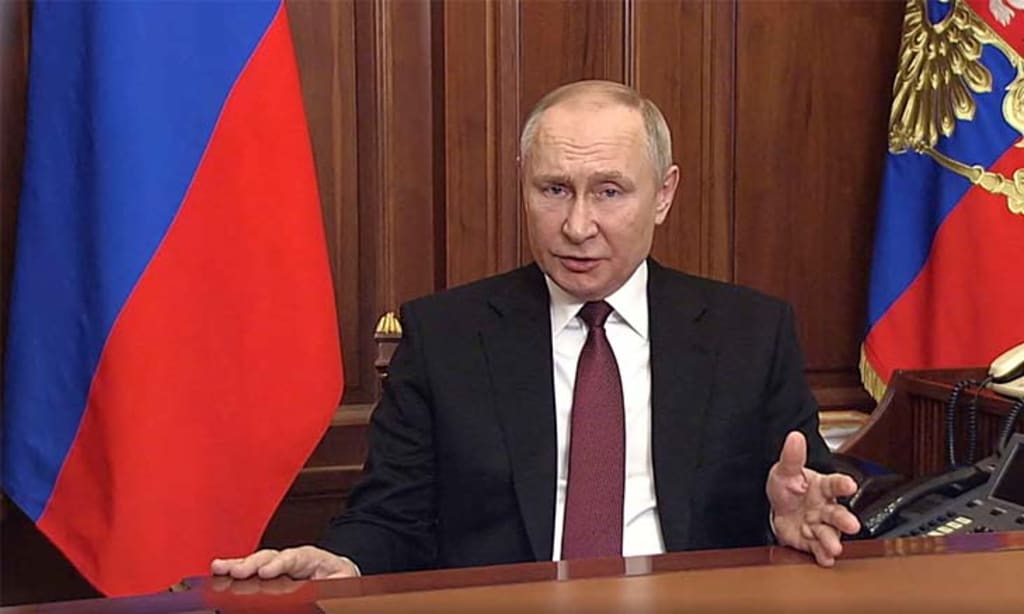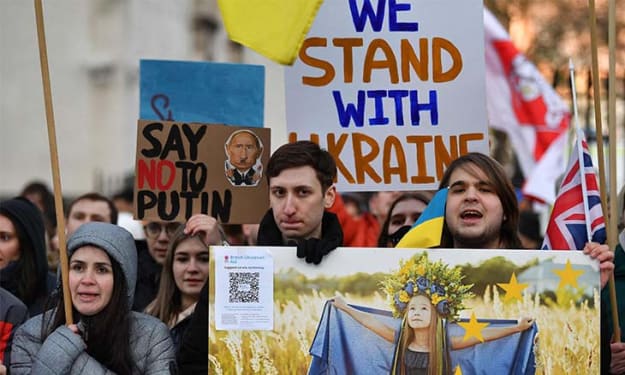
No longer in the White House, an American president named Barack Obama, rubbed his hands for glee at the entanglement of Russian President Vladimir Putin in the Russian quagmire; Nor does he have a successor, Donald Trump, to flirt with Putin to the point of slandering US intelligence in favor of confirming the credibility of the Kremlin; And the one in the White House today, Joe Biden, delusional pricing in new rounds of the Cold War with Russia through cyber skirmishes and diversifying economic sanctions, and omitted (as it is unbelievable that he, being the head of the greatest global power, was heedless or ignorant) that what the storms of dismantling the Soviet Union gathered In Putin's quiver, the tsar's inclination and the imperial whims, it is difficult for him to be blown away by a light passing wind, in Georgia, Crimea or Syria, let alone the amateur games in the Atlantic Alliance on the Ukrainian-Russian border.
In other words, since he seized the reins of power in post-Boris Yeltsin Russia, then tightened the grip through the play of exchanging the presidency with his subordinate Dmitry Medvedev, leading to the organization of a referendum that would keep him in the hierarchy of power until 2036; Putin did not bother to disguise his intentions in consolidating Russia's geopolitical positions on the global map: through direct military intervention in Kosovo, Georgia, Crimea, Syria and Ukraine today, and indirectly (using "Wagner mercenaries") wherever necessary in the four winds of the earth; In addition to the penetration of information systems here and there, starting with the US presidential elections, and sponsoring corruption and tyranny wherever Russia’s interests require, and it is not a shame in the midst of these and other options that Russian mafias receive what they need in terms of intelligence, security and legislative care…
It is not new to mention that Putin enjoyed significant popularity in the Russian populist circles, or those nationalist (in the sense of hard-line and isolationist tendencies) and the categories of blind obedience to the line of the Orthodox Christian Church (as he knows, in their minds, in an intractable confrontation with the Catholic and Protestant Church); It would not be new, therefore, to rally large segments of Russians outside these categories (such as the remnants of the Soviet communists, Leninists and Stalinists alike) behind the war that Putin intends to ignite in Ukraine, from nostalgic premises starting not only with Empress Catherine in the middle of the eighteenth century, nor It ends with the reconstruction of large areas of Ukraine under the supervision of a Soviet comrade named Leonid Brezhnev in the aftermath of World War II. These people may disagree with Putin and his apparatus in everything related to livelihood, social and economic hardship, political freedoms and the mafias of corruption. But today, they are happy with what Putin is doing in Ukraine, and are supporters of him, and some of them may even cheer the life of Stalin (whom history attributes to the responsibility for the annihilation of nearly 3.9 million Ukrainian peasants) at the height of enthusiasm to punish Kyiv.
In the socio-ideological background, a fierce internal battle was and is still raging in Russia, transcending political and organizational variations, and capable even of neutralizing corruption, wealth-sharing and loyalty networks. It revolves between two giant polarizations around which it revolves and converges, or on the contrary, a total of classical liberal currents, “neo-liberal”, communism, reformist socialism, “market socialism” and moderate or extremist nationalist tendencies. Every day, the battle was creating, and crystallizing more and more, two central currents that became an integral part of the complex mosaic that shaped post-Cold War Russia: the occult polarization (relating to the West, shared histories, and cultural and religious ties with Tsar Russia); and Eurasian polarization (relative to Russia's unique location on the decisive frontiers of two continents that witnessed and are witnessing the deepest civilizational conflicts throughout history). This debate dates back to the seventeenth century, the time of Tsar Peter the Great, but it does not stop occupying the hearts of the Russians, before their minds in reality, whenever a conflict erupts that affects Russia’s identity and its cultural and historical personality. As is the case these days, with regard to Ukraine, the West and NATO.
It is not surprising, on the other hand, that Putin finds supporters in the heart of Western societies and politicians in democracies, as he enjoys the support of at least three of the candidates in the French presidential elections this year: the leader of the far-right Marine Le Pen, the new leader of the right The fascist racist Eric Zemmour, and the leader of the leftist "France Proud" movement, Jean-Luc Melenchon. Their reasons vary, of course, but one does not lose sight of the pretext of "national sovereignty" in the first, the Christian Church in the second, and fighting imperialism in the third. Some circles of the American left, in turn, adopt the last excuse, which is worse in terms of general and general ideological coverage; However, when justifying Putin’s crimes in Georgia, Crimea, Syria and Ukraine, it activates the gains in fighting “terrorism” as it claims that the Russian military intervention has achieved them at times, or distinguishes at other times between the right to self-determination in exchange for national territorial integrity, similar to the separatist regions of Donetsk and Luhansk, whose independence Putin recognized about Ukraine.
It is no less worthy to recall the precedent of Chechnya, and that in turn was a round of invasion that began with external interference, with the difference that Washington and the majority of NATO members were, at the exact hour of the invasion, celebrating former Russian President Yeltsin, a dear and honored guest at the Halifax Summit of the Seven Giants of the Universe. For its part, the International Red Cross reports officially stated that there is no Chechen prisoner in the hands of the Russian army, for no other consideration than that this army does not recognize such a designation! As for the fields of the invasion, the Russian army was reproducing the same episodes of violence that ruled the relationship of the Russian central authority with Chechnya throughout the 1990s; Which will be reproduced, more brutal and violent, by Putin and his generals, at the end of the last century.
Not long ago, there was a famous, eloquent and bold statement describing the situation of the Russian presidency thus: “The smell of the dying Kremlin, mixed with the madness of its master, reeks of these strange decisions,” said Boris Nemtsov, who before the statement was a prominent member of the narrow “reformist circle” surrounding a person Yeltsin wraps the bracelet on the wrist. Before him, Gennady Zyuganov, the leader of the Russian Communist Party and head of its faction in the Duma, had quoted Fyodor Dostoevsky to describe the Kremlin: “Six prime ministers in 18 months… Aren't we already in a crazy house?” Not quite, if one wants to rely on a minimum level of fairness, and also not because the Zyuganov party blessed Putin's recognition of the separatists in Donetsk and Luhansk, and thus joined the ranks of Putin's Ukrainian policies, but rather literally embraced the official Kremlin rhetoric which says that the cause of the current crisis is the determination of "the forces Fascism” in Kyiv organized a massacre in the Donbass region against Russian citizens there.
Neither is the house of madmen, then, nor is its master mad; Rather, and in fact the simplest, is to recall the element that may be the most prominent in Putin's geopolitical mentality, and in the dominant structure of his psychological complex, i.e. the imperial/tsarist tendency to revive Great Russia. Not, however, for the sake of fairness here too, but because the crimes of the master of the Kremlin in Kosovo, Chechnya, Georgia, Crimea, Syria and Ukraine were committed intentionally and resolutely; So that the legitimate question says: During his tours with the Atlantic West, did Caesar excuse himself, repeatedly warning them!





Comments
There are no comments for this story
Be the first to respond and start the conversation.